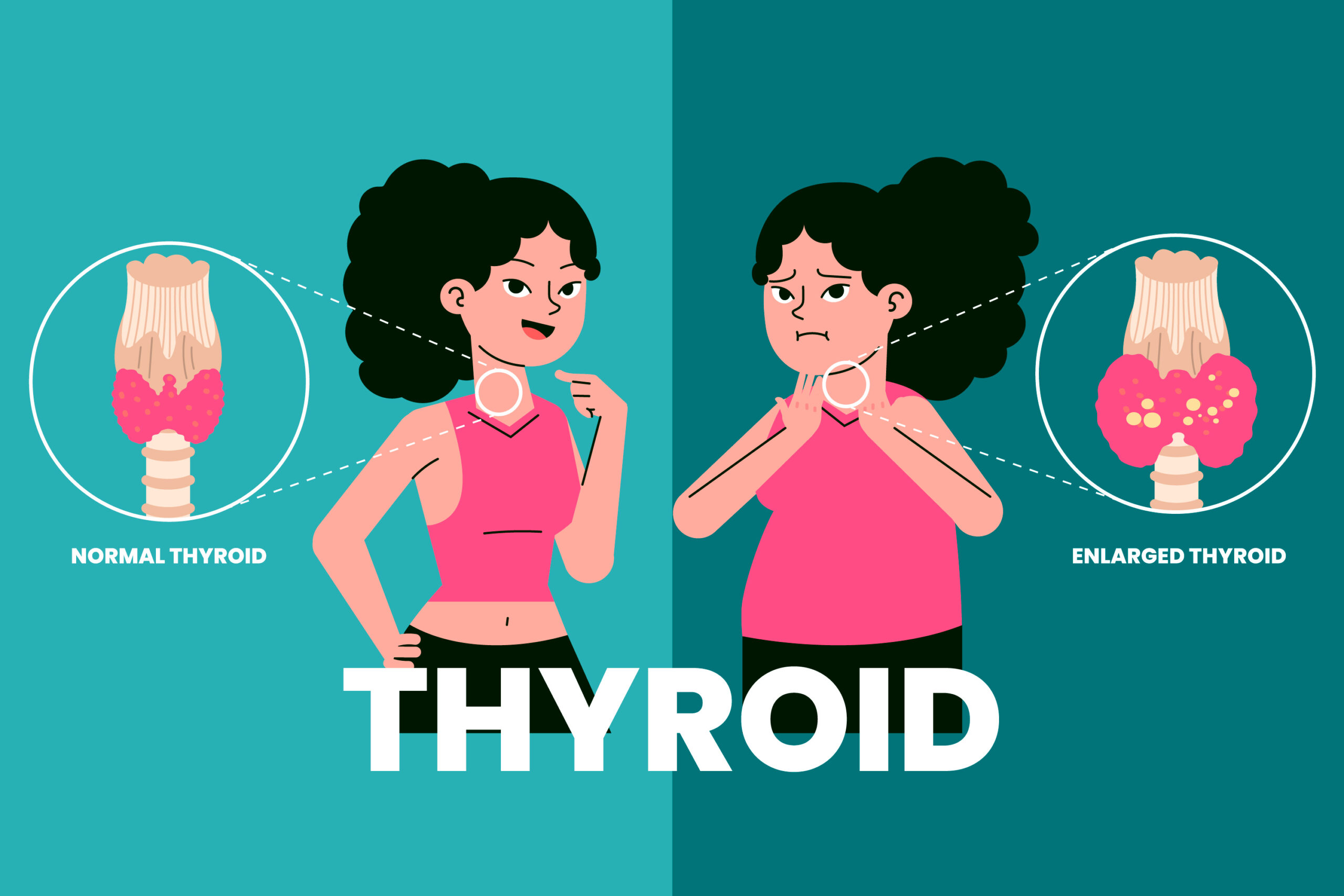Hyperthyroidism: An easy way to control it
What is Hyperthyroidism?
Hyperthyroidism means the thyroid gland is overactive and makes too much thyroid hormone. This makes the body work faster than normal.

Causes (Aetiology) of Hyperthyroidism
- Overactive thyroid gland or thyroid tumors
- Graves’ disease (most common)
- Acute thyroiditis – short-term inflammation, often bacterial
- Subacute thyroiditis – usually due to a virus
- Stress
- Pituitary tumors
- Overuse of iodine
- Overtreatment of low thyroid (hypothyroidism)– you can read a complete article on hypothyroidism by just clicking on the hypothyroidism.
Risk Factors
- Female gender
- Age over 60
- Family history
- Pituitary or hypothalamic problems
- Previous thyroid surgery or radioactive treatment
How It Affects the Body (Pathophysiology)
- The thyroid makes T3 and T4 hormones, which help control how the body uses energy.
- When too much of these hormones are made:
- Body functions speed up (called hypermetabolism)
- Nervous system becomes overactive
- Reproductive hormones are affected
- If it starts before puberty: Delayed sexual growth
- If it starts after puberty: Reduced sex drive, irregular periods, and fertility problems
Signs and Symptoms (Clinical Features)
1. Heart and Blood
- Fast heartbeat (tachycardia)- Tachycardia means the heart is beating faster than normal.
- High blood pressure- more than 140/90 mmHg
- Irregular heartbeats
2. Lungs
- Fast and deep breathing
- Shortness of breath (SOB)
3. Digestive System
- More hunger, but weight loss- Due to higher Increased Metabolism
- Loose stools or diarrhea
- Stomach pain or vomiting
4. Muscles and Body
- Weak muscles
- Feeling tired
- Muscle wasting
5. Skin and Hair
- Hair becomes fine or falls out in patches
- Skin feels warm, moist
- Sensitive to heat
6. Nervous System
- Nervousness, anxiety
- Shaking hands (tremors)
- Overactive reflexes
7. Reproductive System
- In men: Less interest in sex, impotence
- In women: Irregular periods, less fertility
Tests (Diagnosis)
- Low TSH, high T3, T4 levels
- Blood calcium may be high
- CBC (blood test) – more red cells, fewer white cells
- Radioactive iodine test – shows how the thyroid takes up iodine
- Thyroid scan – images of the thyroid gland
- Ultrasound – to check for nodules or swelling
Treatment of Hyperthyroidism
Medical Treatment
- Anti-thyroid medicines (e.g. propylthiouracil, methimazole): Slow down hormone production
- Radioactive iodine: Destroys overactive thyroid cells
- Steroids (like dexamethasone): Lower hormone levels
- Beta-blockers (like propranolol): Help with fast heartbeat and anxiety
- Iodine solutions: Temporarily reduce hormone release
Surgical Treatment
Thyroid Biopsy
- Checks if thyroid lumps are cancer or not
- Helps diagnose conditions like Hashimoto’s or thyroiditis
Thyroidectomy (Removing thyroid)
- Done when medicines don’t work or in cancer
- Lifelong thyroid medicine is needed after surgery
Post-Surgery Care of Hyperthyroidism
| Doctor’s Order | Nursing Care |
|---|---|
| Check vital signs | Watch for bleeding or swelling around the neck |
| Keep head raised | Use pillows and sandbags to support neck |
| Give fluids slowly | Watch for trouble swallowing |
| Pain medicine | Avoid if breathing slows down |
| Help patient cough and breathe deeply | Suction if needed |
| Keep oxygen, tracheostomy set ready | Be alert for breathing problems |
| Check temperature | Watch for signs of thyroid storm (high fever, restlessness, fast heart rate) |
Nursing Care of Hyperthyroidism
- Teach patient about the condition
- Monitor temperature, BP, pulse, and breathing
- Check fluid intake and urine output
- Assess heart sounds and anxiety levels
- Help patient stay calm and rested
- Give high-calorie, nutritious meals
- Avoid foods that may cause diarrhea
- Keep a peaceful environment
- Help with hygiene and comfort
- Support the patient emotionally
- Encourage light walking, rest at night
- Raise bed head to reduce eye swelling
- Monitor thyroid test results regularly
- Talk with family and answer their questions
Nursing Care Plan: Hyperthyroidism
Nursing Diagnosis-I
Imbalanced Nutrition: Less than Body Requirements
Related to– increased metabolic rate
As evidenced by– weight loss, increased appetite, fatigue
Goal– Patient will maintain or gain weight as per nutritional needs within one week.
interventions–
- Monitor daily weight and dietary intake.
- Encourage high-calorie, high-protein, and nutritious meals.
- Offer small, frequent meals to reduce fatigue.
- Avoid foods that increase bowel movement (e.g., caffeine, spicy foods).
- Consult a dietitian if needed.
Evaluation- Patient maintains or gains weight within the target time.
Nursing Diagnosis-II
Activity Intolerance
Related to: fatigue, muscle weakness
As evidenced by- shortness of breath, tiredness with activity
Goal – Patient will report improved energy and tolerate light activities without shortness of breath.
Interventions–
- Assess fatigue level and response to activities.
- Allow rest periods between activities.
- Assist with ADLs (Activities of Daily Living) as needed.
- Encourage short, gentle walks to build stamina.
- Educate about avoiding overexertion.
Evaluation– Patient performs activities with less fatigue and reports improved energy.
Nursing Diagnosis-III
Anxiety of the patient
Related to– effects of excess thyroid hormone
As evidenced by– restlessness, nervousness, rapid speech
Goal– Patient will report reduced anxiety levels during hospital stay.
Interventions–
- Provide a calm, quiet environment.
- Use a reassuring, gentle approach while communicating.
- Teach relaxation techniques (e.g., deep breathing).
- Involve family members in care for emotional support.
- Explain all procedures and treatments clearly.
Evaluation– Patient appears calm and reports decreased anxiety.
Nursing Diagnosis-IV
Risk for Decreased Cardiac Output
Related to– increased heart rate and workload due to excess thyroid hormone
Goal– Patient will maintain stable vital signs and show no signs of heart strain.
Interventions–
- Monitor pulse, BP, and ECG regularly.
- Administer beta-blockers (e.g., propranolol) as prescribed.
- Report chest pain, irregular pulse, or palpitations immediately.
- Encourage rest to reduce cardiac workload.
- Educate patient on the importance of medication adherence.
Evaluation– Vital signs remain within normal limits; no cardiac complications observed.
Conclusion: Hyperthyroidism
Hyperthyroidism is a condition where the thyroid gland produces too much thyroid hormone, causing the body’s metabolism to speed up. This leads to symptoms like weight loss, increased appetite, fast heartbeat, nervousness, and heat intolerance.
The most common cause is Graves’ disease, an autoimmune disorder. Diagnosis is made through blood tests, thyroid scans, and hormone level assessments.
Management includes medications (anti-thyroid drugs, beta-blockers), radioactive iodine therapy, or surgery in severe cases. Nursing care plays a key role in monitoring symptoms, providing patient education, reducing anxiety, supporting nutrition, and preventing complications.
With proper medical and nursing care, most patients with hyperthyroidism can return to a healthy, balanced life.


One Comment